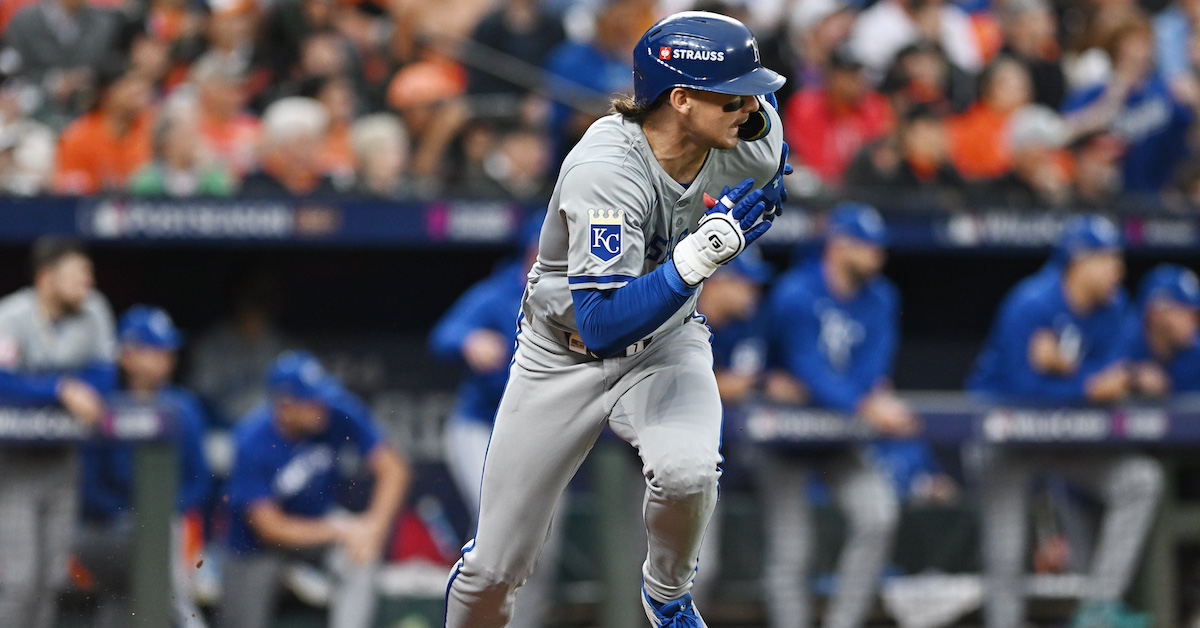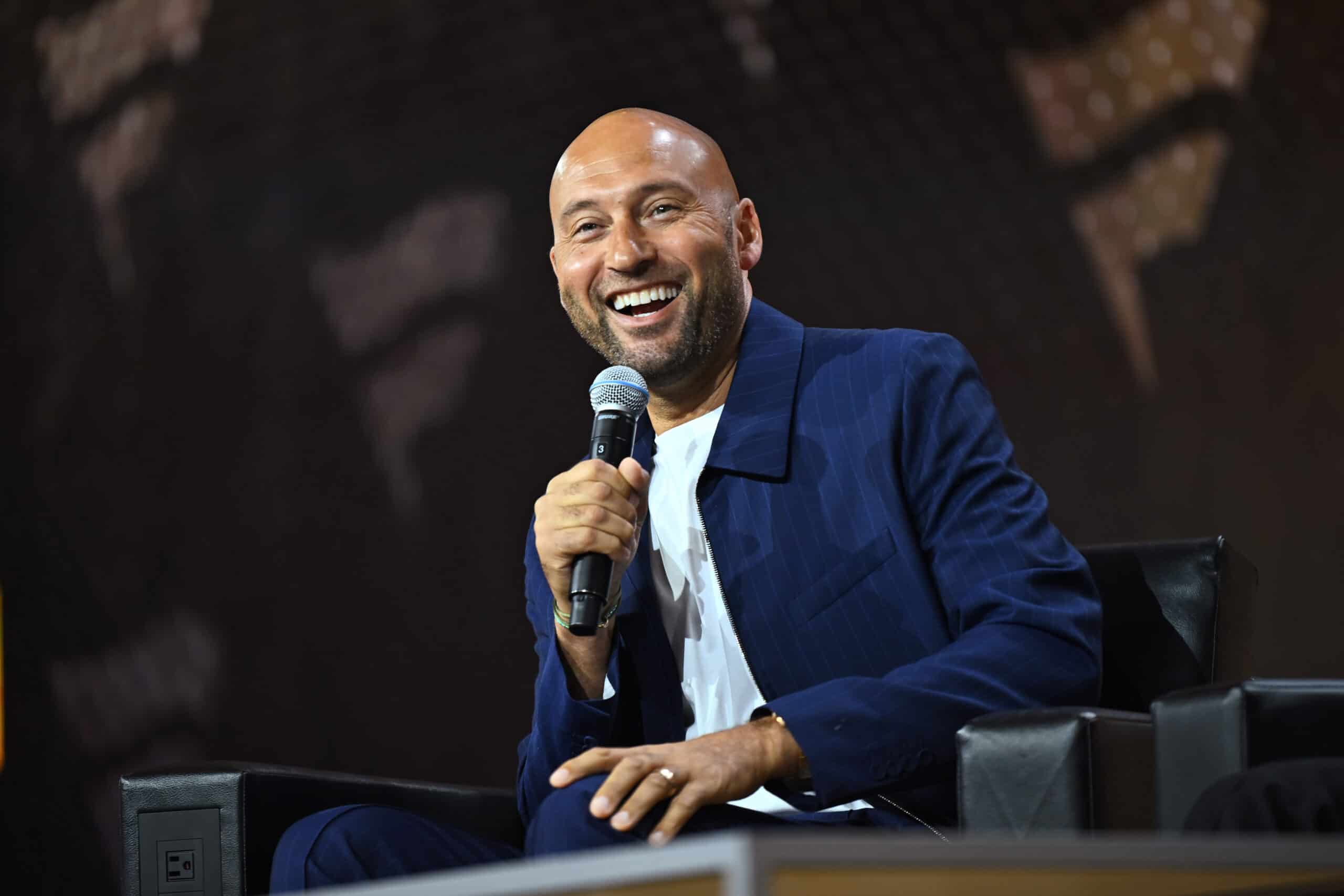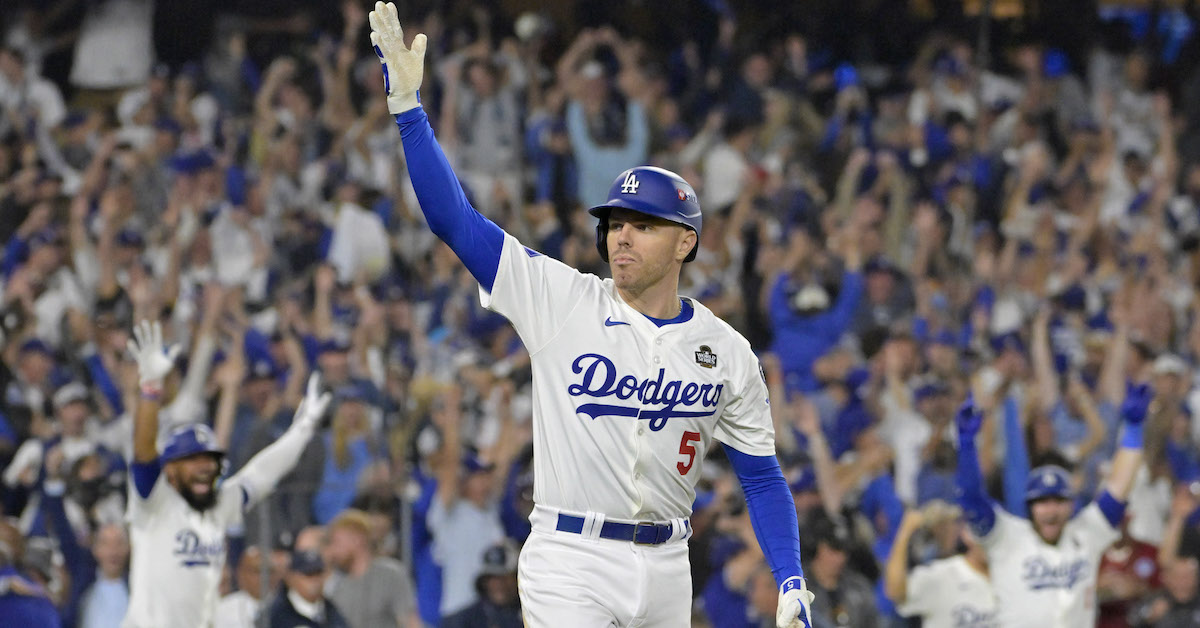[ad_1]
Tommy Gilligan-Imagn Images
BALTIMORE — You don’t achieve superstar status in baseball on speed alone. Evidence of Bobby Witt Jr.’s speed is all over his 10.4-WAR season — 31 stolen bases, 45 doubles, 11 triples — but that’s not why he’s a 10-win player. He’s a 10-win player because he posted a 168 wRC+ while playing elite defense at a premium position.
“That’s what makes him so unique is because he’s got the power,” Royals manager Matt Quatraro said after the game. “He’s got the bat to ball skills, but he’s also got the speed that he gets infield hits, he can do a lot of different things. He is literally the total package when it comes to physical ability on the field.”
It was that speed that made the difference in Kansas City’s 2-1 win over the Orioles on Wednesday night. The second tense, low-scoring game in as many days extended Baltimore’s postseason losing streak to 10 games over 11 years. The Royals, now bound for the Division Series, have won nine of their past 10 postseason series, dating back 40 seasons.
But back to Witt’s legs. For all his other attributes, it’s important to remember that the presumptive AL MVP finalist is freakishly fast. Certainly Jordan Westburg won’t forget anytime soon. The Orioles’ second baseman went up the middle to make a diving stop on a Witt grounder with two outs in the top of the sixth and runners at the corners. It was a great stop, made by the hair on his chinny-chin-chin, full extension evidence of Westburg’s commitment and his anticipation of a ball hit at 108.7 mph.
Westburg’s opposite number, Michael Massey, made a near-identical play two innings earlier to rob Ryan O’Hearn of a likely RBI single and preserve a 1-0 lead, and at the time I thought Massey’s stop was season-altering. The difference: O’Hearn is a slugging DH with 64th-percentile sprint speed. Witt, one of the fastest players in the league, if not the fastest, hauled ass out of the box and beat Westburg’s throw. Not by much, but he beat it.
That effort, which could’ve come off the bat of any Punch-and-Judy speedster instead of the most dangerous hitter the Royals have had since George Brett, extended the inning and allowed Kyle Isbel to score the go-ahead run from third. It was Witt’s second game-winning RBI in as many career postseason appearances. With a 1-0 Royals win on Tuesday and a 2-1 Royals win on Wednesday, it’d be reasonable to assume that both games had similar contours. That wasn’t really the case.
A man-on-man pitchers’ duel in Game 1 led into a buffet of missed opportunities in Game 2. Traffic on the bases was constant. Both starters, Seth Lugo and Zach Eflin, persistently flirted with danger but avoided going home with it. Neither lasted five innings, though each departed having allowed only a single run. The Royals and Orioles combined to score three runs but leave 21 men on base and go 2-for-13 with runners in scoring position, both Royals singles on unremarkable groundballs.
In fact, the two clubs combined to go 4-for-23 with runners in scoring position. All four hits were singles. One was Witt’s decisive infield hit in Game 2; the other three maxed out at 90.5 mph. The Orioles’ lone hit with runners in scoring position in the series, a Cedric Mullins knock in the fifth inning of Game 1, didn’t even score a run.
The Royals, who waited until the sixth inning to score on Tuesday, drove home their first batter of the afternoon Wednesday. Massey led off the game with a double, moved to third on a grounder to the right side by Witt, who was deep into his Freddie Patek tribute act all afternoon, then scored on a single by Vinnie Pasquantino. Eflin and Lugo traded zeroes for the next four innings, but in contrast to Game 1, when Cole Ragans and Corbin Burnes might as well have been throwing to empty batter’s boxes, openings kept appearing.
The Orioles, having scored a single run in 18 innings of a home playoff series, will spend all winter tossing and turning over the ineptitude of their offense — and they should — but they were on the verge of getting to Lugo. In contrast to pitchers who might keep something in reserve early in the game, so as to give different looks on subsequent trips through the order, Lugo threw eight different pitch types to his first nine batters. And it was just barely enough.
The Orioles had baserunners in the first and second innings. They put two men on with one out in the fourth, moved them both into scoring position with two outs, and thanks in part to Massey’s acrobatics, came away with nothing. Mullins, Baltimore’s lone offensive bright spot in Game 1, crushed a home run to start the fifth inning, and then the Orioles went to work on a rally. A single, a walk, and a fielding error by Lugo loaded the bases with nobody out, and brought 40-homer man Anthony Santander, an Orioles lifer playing what could well be his last game in black and orange, to the plate.
The past decade has been pretty rough for Orioles fans. Thanks to front office ineptitude followed by ownership neglect disguised as a half-decade-long tank job, the Orioles went eight years between home playoff games. In last year’s ALDS against Texas, with the games coming on a weekend and Baltimore a heavy favorite, there was an irrepressible excitement in the crowd. This time around, having been frustrated last October, the atmosphere was a little more subdued. This being a big ballpark in a tiny city on a weekday afternoon, there were some 6,000 empty seats in Camden Yards for Game 2.
But more than that, the happy-to-be-here was gone. The crowd would not settle for another runner-up’s ribbon. Instead, they were begging for a reason to explode. Lugo, the man of a million pitches, grooved a 93 mph four-seamer right down the pipe to Mullins, who might not be the 30-homer threat he was a few years ago, but is hitter enough to blast a meatball like that into the seats.
Concurrently, decade’s worth of catharsis poured out of the stands. When the Orioles loaded the bases and chased Lugo within the next four hitters, it only got louder. This was the moment. Obviously. Baltimore’s star-studded offense was about to erupt like an unclogged pipe. The optimism lasted a matter of moments.
Reliever Angel Zerpa managed to strike out Colton Cowser on a pitch that actually hit the Orioles outfielder, causing what turned out to be a season-ending hand injury. Adley Rutschman followed. The star catcher has been mired in a half-season-long slump, and earlier in the game had crushed a ball that would’ve gone over basically any wall in the park, except the 410 foot mark in deep center field. Which is where he put it. Rutschman grounded out to Witt to end the inning. No further damage, and a few minutes later, the guy who got drafted one pick after Rutschman drove in the final run of the series.
The Orioles scratched out two-out baserunners in both the seventh and eighth innings, but the bases loaded, no out situation they wasted in the fifth… well, they’ll have to wait until April to see another chance that good.
The Royals pride themselves on their pitching and defense. “That’s what we preach as Royals,” Witt said. “We play defense, run hard, be aggressive, so that’s what we’ve got to do to keep winning.” And you could argue that this sweep is a triumph of Kansas City’s run prevention. Witt and Massey were superb defensively, Ragans electric in his first postseason start.
The Royals’ bullpen had been a liability for most of the year, and apart from Lucas Erceg, I did not have much faith in it entering the series. In 7 2/3 innings of work across two games, those relievers were superb. Flawless, you might say, since they didn’t allow a single run to cross the plate on their watch.
I’ve been impressed…
[ad_2]



